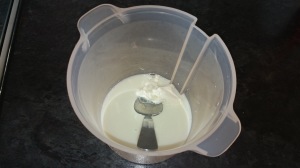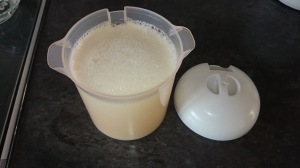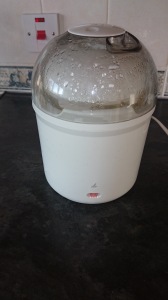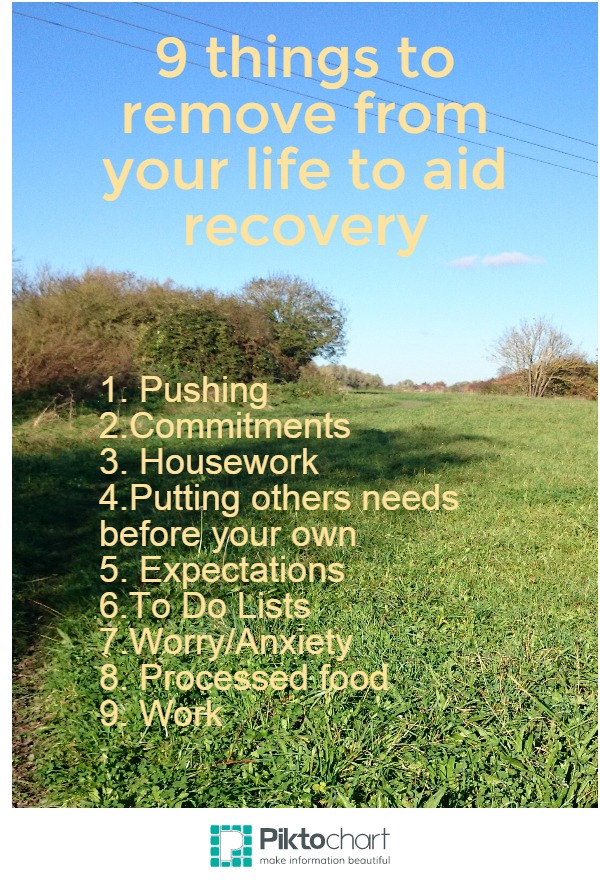I’m a bit late getting this post out, as I’ve been following my own advice and prioritising, and unfortunately this post got pushed down the list. There’s still a few days to go, so here’s a few tips to help you through the festive season:
1. Prioritise
If you have limited energy you have to accept that you can’t do everything. To make Christmas the best it can be don’t waste energy on things you don’t care about.
My first Christmas with ME/CFS I was in a bad way. I had a relapse caused by bronchitis and was largely bed bound. Before my relapse I had made a list prioritising what was most important to me about Christmas. This was to help me decide what to say no to, and what to go ahead with. In the event I had to say no to almost everything.
That year I made the top two items on the list: – watch my kids open their presents and eat Christmas dinner with my family. I spent the rest of the day in bed, happy that I’d managed that. Of course there were a lot more items on my list that I didn’t manage, but if I had used my energy on some of the items lower down my list I may have missed my top two.
This year I have loads going on: I’m singing in choir concerts, going to parties, buying presents, wrapping them and cooking the Christmas dinner (with gluten and lactose free substitutions for those that need them). It may sound like I’m doing it all, and yet I am still editing out activities that I don’t value. For example I’m not sending Christmas cards and we’ve said no to some social engagements. I am still prioritising, it’s just I can say yes to a lot more.
If you always visit Great Aunt Mildred, but you don’t enjoy it, then I urge you not to use your energy that way. You may think that’s being selfish, I think it’s taking care of yourself, and that’s important.
Your priorities may be very different to mine. Perhaps the most important part of your Christmas is seeing your friends in the pub on Christmas Eve, or going to midnight mass, or visiting your Gran. Think about what is important to you, put your energy towards that and try and steer clear of the parts you don’t value.
2. Rest
With all the extra activity going on it’s important to make time to rest. I admit I need to improve on this one at the moment. It’s easy to get caught up in the list of things to do, but number one on the list every day should be the rest you know you need. At the moment I’m trying to rest once a day, although I can get through the day without a rest. This time two years ago, I was virtually bed bound and spending most of my time resting, and this time last year, I was on 2-3 rests most days. Our rest requirements are individual, and change as our illness changes. Prioritise whatever the rest is that you need.
3. Sleep
My sleep is generally good, since I dealt with my adrenal fatigue. However, I’ve noticed in the last week I am taking longer to drop off to sleep at night and hence finding it harder to get going in the morning. I think this is a sign that I need to spend more time resting/meditating in the day, so that I am calmer when I go to bed. Sleep needs to be a priority because if you aren’t sleeping well, you aren’t good for much in the day.
4. Lower other’s expectations
The people you live with probably have a good idea of how much/little you can do. However, at Christmas we often spend time with family and friends who know us less well. It may be helpful to have a conversation about your capabilities. For example, last Christmas my extended family knew I would probably need to go and rest at some point in the day, so when I disappeared for an hour or two no-one was worried. My friends also know I am likely to be one of the first to leave a social gathering. This is also a great way to get out of the washing up after Christmas Dinner!
5. Focus on Nourishing Food
There are lots of “treat” foods around at Christmas. I’ve recently discovered some extremely tasty gluten free mince pies, and the box is already empty! I am not going to be sugar free over the holidays, but I will still be eating plenty of nourishing foods. By focusing on nourishing my body rather than banning all the treats I find a balance I am happy with.
Being gluten free means that I have to say no to lots of the yummy treats that appear. I have several coping strategies for that. For example at a pot-luck buffet I know I will hardly be able to eat anything (other than the dish I take), so I will ensure I eat before I go. I am buying and making gluten free versions of favourite Christmas treats (hence the mince pies).
6. Go easy on the alcohol
Some people with ME/CFS are alcohol intolerant. I was for quite a long time. Even a quarter of a glass of wine would make me feel like I had the worst hangover ever. Given that ME/CFS symptoms can seem like you have a hangover 24/7 I didn’t feel much like drinking anyway, and if you’re in the early phases of the illness you probably won’t either.
Now I can indulge in moderation, and on special occasions I will have a glass or two of my favourite tipple. The problem with Christmas is that it can feel like a special occasion every night. I have a rough idea of when I will be imbibing and when I will stick to soft drinks. However, I want to allow room for spontaneity, so it’s not set in stone. Also if I start to struggle with symptoms or energy levels then alcohol will be the first thing to go.
6. Delegate
My husband is great at picking up the slack when I can’t manage things. In previous years he has managed to cook Christmas dinner, buy and wrap all the presents, supervise the kids decorating the Christmas tree and all the other myriad of jobs that go to making Christmas in our house.
You may decide you’d rather not bother with Christmas decorations, or perhaps it’s really important to you to have the house festooned from December 1st. Think about what’s important, and if it is important then see who can help you.
7. Be flexible
There’s a lot of traditions around Christmas. My kids have very clear expectations. There’s a long list of we always ……put the stocking on the banister; leave a mince pie and a glass of milk for father Christmas (we tried to persuade them he’d prefer a whisky, but they were adamant about the milk) etc. etc.
It’s good to recognise that although you’ve always done things one way, they don’t have to be done that way for ever, and indeed these things naturally evolve as the ages of those participating in Christmas change. For example if the children are older perhaps the tradition has changed from playing with toys whilst the dinner is cooking to going down the pub. Although there are a lot of expectations at this time of year, we are free to change things. Think of how you can change your day to make it easier for you, but still enjoyable for everyone.
8. Be Grateful
Instead of moaning about all the things you are missing out on, be grateful for the things you do manage to do, and the people you manage to spend time with. Focusing on things I’m grateful for really helps me to stay positive when things are tough.
9. Have Fun
Enjoy yourself. Laughter is the best medicine.
Merry Christmas








